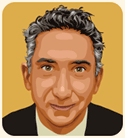On April 17-19, President Barack Obama will travel to Trinidad and Tobago for the fifth Summit of the Americas that will convene all 34 democratically elected heads of state from the hemisphere. To see a U.S. president focus so much attention on the region so early in his administration (in only his third international forum) is historic—and positive.
But beyond symbolism and a president’s rare attention it’s unclear what he can concretely achieve. One thing he can do is reject the Venezuelan government’s blatant attempt to throw into question the human rights system in the Americas that for 50 years has protected and defended the rights of citizens, journalists and activists against disappearances, murder and censorship in places like Argentina, Chile and Peru.
Sure, the mere act of having one of the most popular presidents in the world step onto the regional stage is no small matter. He’s more popular than the avowed enemy of the U.S. empire, Venezuelan President Hugo Chávez.
That fact and his ability to speak directly to Latin Americans about his views of the region and the need for renewed partnership will set a whole new framework for our relations in the hemisphere.
The word is that President Chávez is already worried about being upstaged. He’s holding a meeting of his regional allies, Presidents Evo Morales, Manuel Zelaya (of Honduras) and Daniel Ortega (of Nicaragua) in Caracas on Tuesday and Wednesday, presumably to try to steal the spotlight from the globally popular president. The first two did it at the last Summit of the Americas in Mar del Plata in 2005 when President Chávez and then-street protestor Morales held a shadow summit in a soccer stadium and denounced the free-trade agenda of the Summit. (Fully 32 members signed on to the official Summit declaration, but the rag-tag, shadow summit/protest got all the news.)
No doubt they—or at least President Chávez—will attempt something this time around too. The Bolivarian blow hard is not one who likes to share the spotlight or hold his tongue. The question is if the others (like President Morales and Ecuadorian President Rafael Correa who claim they want a pragmatic relationship with the U.S.) will follow him.
What does remain clear, though, is that this time the U.S. brings a coalition with it. Through President Obama’s earlier discussions with Brazilian President Luiz Inàcio Lula da Silva (Lula) and Mexican President Felipe Calderón, and Vice President Joe Biden’s trip to Chile for the progressive government meeting where he met with Chilean President Michelle Bachelet, President Lula, Argentine President Cristina Fernández de Kirchner and later to Costa Rica where he met with President Oscar Arias and President-elect Mauricio Funes from El Salvador, this U.S. delegation will be arriving in the Port of Spain well-versed on the interests of many of the participants and with a consensus agenda. This time, unlike 2005, it’s unlikely that President Obama will find himself either upstaged or isolated.
But all of this is really just the show around the Summit—and may in fact be the only part of the Summit that matters. In the last four meetings of the Summit of the Americas (Miami 1994, Santiago 1997, Quebec 2000, Mar del Plata 2005) the meetings have accumulated bureaucracy and mandates that go far beyond the original intent (and authority) of such gatherings. They range from education budgets, poverty and municipal administration to energy and environmental security. A mere look at the 11-page declaration being prepared for the presidents’ signatures in Port of Spain demonstrates its irrelevance, filled with platitudes that really no international summit can effect (education budgets?).
Worse, delegates from Venezuela have been trying to weaken the declaration by including a statement that the Inter-American Commission for Human Rights is politicized. The reason? The Commission is about to issue a report that includes criticisms of recent developments in Venezuela. The Commission has always—from the military junta in Argentina to General Pinochet in Chile to President Alberto Fujimori’s paramilitary squads—served as an impartial, moral voice in the defense and promotion of human rights. What a shame it would be if the Summit statement, already a vacuous wish list, included an openly political jab at one of the few institutions that work in the Inter-American System.
For all the groundwork and star power that President Obama brings to the Summit, rejecting this language will demonstrate that this semi-regular gathering of regional elected leaders is not for naught—that it can translate into hard decisions and as the President himself said in his inaugural address serve as a forum to demonstrate his willingness extend a hand to those governments but only those that are willing to open their fist.




